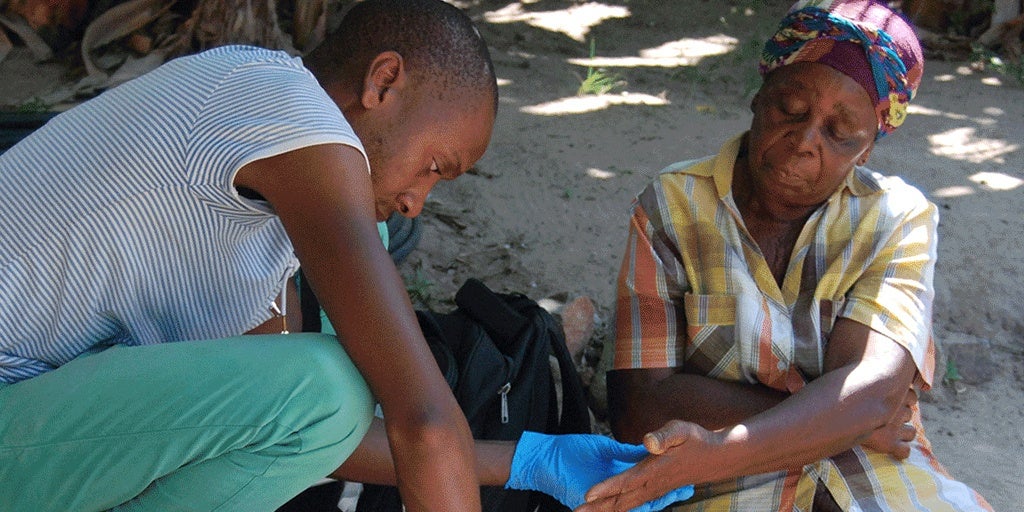Researchers in the The Health and Aging in Africa: a longitudinal study of an INDEPTH Community in South Africa (HAALSI) project explored whether those people living with HIV receiving antiretroviral therapy (ART) might have better chronic disease (e.g. hypertension, diabetes) control and numbers resulting from the “cascade” of care. The results are published in JIAS.
Age more than illness linked to increasing levels of depression in South Africa
A study by HAALSI researchers explores whether the connection between chronic illness and depression that is commonly found in high-income settings exists in sub-Saharan Africa as well.
Immediate eligibility of ART lowers household-level incidence of HIV by over 40%
A study finds that early eligibility of antiretroviral therapy substantially lowered HIV incidence among HIV-uninfected household members in rural South Africa. The team of researchers who published the findings includes Harvard Pop Center faculty members Drs. Kenneth Mayer and Till Bärnighausen, as well as visiting scientist Guy Harling.
Up-to-date details on aging South African population experiencing dramatic demographic shift
A cohort of adults aged 40 and over living in rural South Africa is the focus of Health and Aging in Africa: A Longitudinal Study of an INDEPTH Community in South Africa (HAALSI). A cohort profile published in the International Journal of Epidemiology shares details of the study which is aimed at shedding light on the socioeconomic and health challenges faced by an aging LMIC population.
Measuring frailty—a key predictor of mortality and morbidity in higher income countries—in the now aging South African population
A team of researchers affiliated with HAALSI, a project focused on the aging population in South Africa, has published a study in BMC Geriatrics that finds frailty to be associated with worse health and well being, and earlier death in an aging, rural South African population.
CVD risk management varies in South Africa by gender, socioeconomic & disability status
A study just out by a team of HAALSI researchers finds that in South Africa cardiovascular disease risk is not being managed as well for women, those of lower socioeconomic status, and for those with physical disabilities.
Depression and anxiety levels increase with age and vary by gender in aging South African population
Harvard Bell Fellow Collin Payne, PhD, is author on a paper in Demography that takes a rare look at the mental health status of aging adults in Malawi, South Africa, a low-income setting with a high incidence of HIV. Findings suggest that declining levels of physical health with age may be a key driver of the rise in depression and anxiety.
In South Africa, when HIV testing is not always possible, is self-reported status a viable, reliable alternative?
A team of researchers affiliated with the Harvard Pop Center and the Health and Aging in Africa: A Longitudinal Study of an INDEPTH Community in South Africa (HAALSI) has found that the self-reported HIV status of older adults was accurate enough that it could be considered as a routine first step to establish HIV status when testing is not possible. The study was published in JIAS (Journal of the International Aids…
Hypertension well managed for those older South Africans whose health was monitored by long-term surveillance program
A study just out in the Journal of Hypertension co-authored by Harvard Pop Center faculty members Stephen Tollman, Till Bärnighausen, Joshua Salomon, and Bell Fellow Xavier Gomez-Olive points to the potential effectiveness of a local, long-term health surveillance program for managing hypertension, the leading risk factor for cardiovascular disease. The results of the study shed light on which members of the population should be receiving even more attention.
How do functional abilities of aging population in South Africa compare to those in other LMICs?
Researchers affiliated with the Harvard Pop Center have authored a paper based on research from the Health and Aging in Africa: a Longitudinal Study of an INDEPTH Community in South Africa (HAALSI) study that finds that older South African men had 30% higher odds than women of being limited when it came to performing activities of daily living (ADLs), and that this cohort in South Africa (men and women) did not…
